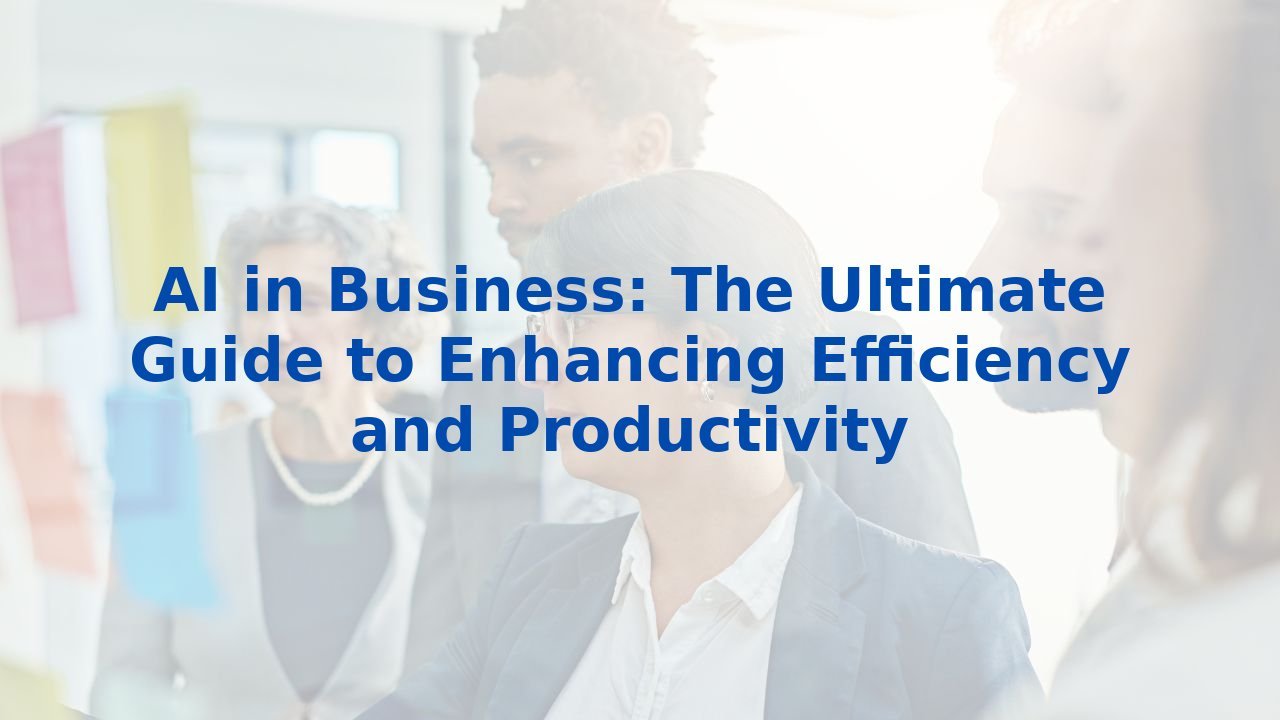AI in Business: The Ultimate Guide to Enhancing Efficiency and Productivity
AI in Business: The Ultimate Guide to Enhancing Efficiency and Productivity
In an era defined by rapid technological advancement, the question is not whether businesses should adopt artificial intelligence (AI), but how effectively they can integrate it to enhance operational efficiency. AI represents a paradigm shift in business, empowering organizations to streamline processes, foster innovation, and unlock unparalleled productivity. Let’s delve into how AI can reshape key business functions to yield significant benefits.
Automating Routine Tasks
At the heart of AI's transformative power lies its ability to automate mundane tasks. Imagine freeing your team from the shackles of repetitive data entry, invoice processing, or appointment scheduling. AI-powered bots and applications efficiently handle these duties, ensuring that human error is minimized and workflows are accelerated. This reinstatement of time and focus allows employees to dedicate their energies to high-value, strategic initiatives that fuel growth.
Process Optimization
Every organization grapples with inefficiencies in its processes. AI's analytical capabilities can shine a spotlight on bottlenecks and redundancies, making it an invaluable resource for any business pursuing optimization. By harnessing AI to analyze workflow patterns, organizations can restructure tasks, automate manual interventions, and allocate resources more effectively. The result? Processes that not only get tasks finished faster but also save the organization time and money.
Quality Control and Assurance
When it comes to product quality, attention to detail is critical. Here, AI's ability to monitor manufacturing processes in real-time shines through. By detecting defects or irregularities at early stages, AI enables businesses to uphold stringent quality standards and prevent inferior products from hitting the market. The implications are clear: improved product quality, reduced waste, and a safeguarding of the brand's reputation—which is invaluable in today’s competitive landscape.
Risk Management
Navigating the complex world of business comes with its own set of risks. AI can help illuminate unseen threats and opportunities by analyzing vast datasets to reveal emerging trends and predict market volatility. This analytical foresight equips businesses with the tools they need to proactively mitigate risks while capitalizing on opportunities as they arise, fostering a more resilient and agile operating environment.
Supply Chain Management
The dynamics of supply chains, often fraught with unpredictability, can benefit immensely from AI’s insights. By analyzing historical and real-time data, AI can predict demand fluctuations, optimize inventory levels, and even suggest efficient shipping routes. The outcome is a supply chain that is not only responsive but also cost-efficient, reducing delays and minimizing carrying costs across the board.
Employee Training and Productivity
One often-ignored area is the potential for AI to optimize employee training. AI-driven platforms can tailor training experiences to individual learning styles, maximizing knowledge retention and engagement. When employees are equipped with the skills to utilize AI effectively, their productivity increases significantly. This personalized approach enables them to tackle challenges more adeptly and contribute to the organization's success.
Fraud Detection
In the realm of security, AI’s pattern recognition capabilities are unmatched. By scrutinizing transaction data and user behavior, AI can swiftly highlight discrepancies and flag potential fraud. This capability not only protects a company's assets but also serves as a safeguard for valuable customer trust.
The Impact of AI on Employee Productivity
Statistics indicate that AI not only enhances individual performance but also bridges the gap between diverse talent levels within an organization. Research has shown that the implementation of generative AI tools can facilitate up to a 66% increase in task throughput among business users. The best part? Even those traditionally lagging behind can experience boosted productivity levels, signaling that AI serves as equalizing force that propels overall organizational development.
Benefits of Training Employees for AI
While AI can automate many tasks, the onus is on organizations to ensure their workforce is well-equipped to utilize these tools. Training employees in AI presents numerous advantages:
- Enhanced Efficiency: Trained employees leverage AI tools to streamline workflows, leading to unparalleled efficiency.
- Improved Decision-Making: Armed with AI knowledge, employees can make better-informed, data-backed decisions.
- Better Collaboration: Effective training fosters collaboration between employees and AI systems, integrating technology seamlessly into daily operations.
- Adaptability: As changes emerge, employees well-versed in AI can pivot more quickly and adopt new technologies with ease.
Conclusion
Embracing AI in business is no longer a choice but a strategic necessity. The benefits are wide-ranging, from automating mundane tasks to optimizing intricate processes, all while enhancing decision-making capabilities. As organizations step into the future, investing in both AI adoption and employee training is vital to harnessing its full potential. The journey towards operational excellence is laden with opportunity; it’s time to seize it.
To further your understanding and implementation of AI within your organization, consider exploring resources and courses designed to equip your workforce with the necessary skills. Empowering your team not only prepares them for the future but strengthens your business's competitive edge.



